Life on Exchange in India
6 April 2020 | By Maanvi Dhillon (Level III, McCall MacBain one-term grant recipient, studying in India)
 Something I decided long before I arrived in India last August for a semester studying abroad was that this trip would be a break. Second year drained me and the stress dimmed my appreciation for even my most interesting courses; summer brought tensions that implicated people I love; and I was tired in a way I had never known before. This was a pause from faces I had seen too much, essays written at 2am with no heart, meandering career questions, and dense readings that I felt guilty about not keeping up with. For all I loved about Artsci, I couldn’t wait to run far away from it for a little while.
Something I decided long before I arrived in India last August for a semester studying abroad was that this trip would be a break. Second year drained me and the stress dimmed my appreciation for even my most interesting courses; summer brought tensions that implicated people I love; and I was tired in a way I had never known before. This was a pause from faces I had seen too much, essays written at 2am with no heart, meandering career questions, and dense readings that I felt guilty about not keeping up with. For all I loved about Artsci, I couldn’t wait to run far away from it for a little while.
I should have known better. After all, I picked Ashoka University just like I picked our program: for every surprising twist it exposed in subjects I thought I knew and for the way it responded to the world’s chaos and callousness with smart questions and hope. My timetable was characteristically random: social and political history of India, journalism, religious studies, and a first-year literature course that was eerily similar to Artsci’s own “Practices of Knowledge” course. Despite my pretense of wanting a very non-academic four months, I found myself in courses that made me think, read, and write as much as ever.
That’s not to say my experience was familiar–it was anything but. Ashoka’s campus sits in the middle of farmland, off a highway in the rural state of Haryana. It’s a trek to make off-campus excursions–Delhi required an hour on the shuttle and subway–so I got to know my temporary home quite well. They had a nice gym with a resident pigeon who would swoop down and give me a scare every now and then. The hotspot for food was the dhaba, which served amazing North Indian food until 4am every day. And yes, 4am isn’t a typo because nights were lively in a confined campus of kids who put as much energy into 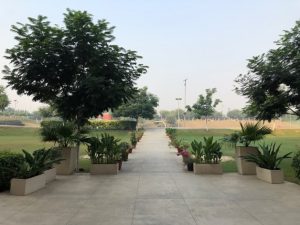 their schoolwork as their off-time. Personally, my favourite time there was the beginning of the day: everything looked its prettiest in the dewy morning light, from the marble floors to the leafy potted plants.
their schoolwork as their off-time. Personally, my favourite time there was the beginning of the day: everything looked its prettiest in the dewy morning light, from the marble floors to the leafy potted plants.
There was difficult stuff too: an infirmary I had to visit way too often; my ongoing battle with a cranky librarian; a giant bully of a monkey that tried to mug me on a mountain hike; embarrassing failures of communication with staff who only spoke Hindi; puzzling assignments and few class friends to help me decipher them; and cultural differences that made me feel weird and lonely. But every quest has its trials and tribulations, right?
Sometimes you need to step away from something to really see it for what it is. I thought I was taking a break from Artsci, but I found myself searching for the same education an ocean away. And I found it in a history course that was more interested in ideas and ethics than dates and names, and a literature one that analyzed sexuality in everything from Urdu poetry to Descartes’ Meditations. More importantly, I found it far beyond my classrooms. People I had the privilege of calling my peers walked straight into dangerous protests when a fellow liberal university was attacked and its students assaulted by mobs back in December; I read their Facebook posts with fear and pride and inspiration. Indian politics can seem dismal at the surface, but a government in Delhi was finishing up a revolutionary term, and I witnessed the evidence myself hearing a proud public school teacher talk about their new curricula and soaring test scores and walking through a free healthcare clinic located in a slum occupied by refugee families. While stalking one of that government’s policy consultants online, I saw that his Twitter cover photo was the School of Athens painting we talked about all the time in first year “Practices of Knowledge.”
 At first, it surprised me that the mood and philosophy of Artsci is so ubiquitous: how can something so special be everywhere? I’ve now realized how wrong I was to see things that narrowly. Artsci isn’t just a small program of 60 students who take so and so courses with so and so professors, read so and so texts, write so and so essays, and emerge packaged, smart, and ready. To me, Artsci is an approach that is special, but thankfully and wonderfully not in short supply. Our values–to be critical, brave, reasoned, creative, empathetic–are in people and spaces all over the world, and we will leave this place with the gift to find and connect with those communities with ease.
At first, it surprised me that the mood and philosophy of Artsci is so ubiquitous: how can something so special be everywhere? I’ve now realized how wrong I was to see things that narrowly. Artsci isn’t just a small program of 60 students who take so and so courses with so and so professors, read so and so texts, write so and so essays, and emerge packaged, smart, and ready. To me, Artsci is an approach that is special, but thankfully and wonderfully not in short supply. Our values–to be critical, brave, reasoned, creative, empathetic–are in people and spaces all over the world, and we will leave this place with the gift to find and connect with those communities with ease.
I wrote hasty essays and fumbled through class discussions at Ashoka (with no regrets: every weekend trip and late-night hangout was worth being a messy student), but not a single part of me doubts that it was one of the most educational, fulfilling, useful, and important highlights of my life. It’s funny and surreal to recognize your own learning, but I see mine every day, from the way I read the news to the way I think through readings. The most comforting thing I learned, especially as graduation gets frighteningly close, is that if Artsci is everywhere, I’m never going to have to take that break I thought I wanted so badly.
CHE, TELL ME ABOUT ARGENTINA…
2 December 2019 | By Kartik Sharma (Level III, McCall MacBain International Fellow, studying in Argentina)
Sitting on the patio in my homestay, about 25 kilometers east of the Andes and its spectacular landscapes, I am trying my best to sum up the past three months of living in Mendoza, Argentina. In a nutshell, the past three months have been overwhelming, educational, frustrating, exciting, eventful, and a lot of fun. Arriving in August, I stepped out of the airport speaking very little Spanish and knowing unsettling little about what exactly I was getting into.
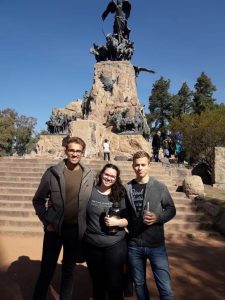 In the three months since I arrived in Mendoza, I have been taking Spanish classes for four hours per day. My school promised individualized attention and certainly delivered on it. Almost all of my classes are one-on-one with one of my teachers; there’s no space for zoning out or letting the class drift by as my mind idles elsewhere. The intensity of my classes has certainly been advantageous for advancing my Spanish skills. I have gone from being scared of buying vegetables from the nearby verduleria to recognizing the employees and exchanging jokes or small talk with them whenever I drop by. Furthermore, as my Spanish has improved I have been able to make some friends here; chatting with them has taught me a lot about life in Mendoza and it always brings a smile to my face when they greet me with a cheery “Che!”, a very Argentinian expression of endearment and affection. These kinds of small wins have really helped me stay motivated.
In the three months since I arrived in Mendoza, I have been taking Spanish classes for four hours per day. My school promised individualized attention and certainly delivered on it. Almost all of my classes are one-on-one with one of my teachers; there’s no space for zoning out or letting the class drift by as my mind idles elsewhere. The intensity of my classes has certainly been advantageous for advancing my Spanish skills. I have gone from being scared of buying vegetables from the nearby verduleria to recognizing the employees and exchanging jokes or small talk with them whenever I drop by. Furthermore, as my Spanish has improved I have been able to make some friends here; chatting with them has taught me a lot about life in Mendoza and it always brings a smile to my face when they greet me with a cheery “Che!”, a very Argentinian expression of endearment and affection. These kinds of small wins have really helped me stay motivated.
Outside of class, I have also been keeping busy. In Canada, I play volleyball a couple times a week for fun and to stay active, so I was hoping to find a place to play in Mendoza. Sadly, my internet searches and visits to a few sports clubs were fruitless. However, one day while visiting a kiosco near my language school to load money onto my public transit card I struck up a conversation with Rodrigo (who was working there at the time). By chance, he mentioned that he plays volleyball at one of the local universities with a group of other students, so of course I had to ask if I could join! Since then, I have been playing volleyball with about 25 students from the university three times a week. It has been a great experience and the students have all been incredibly hospitable, inviting me to join them for juice and medialunas (sweet croissants found everywhere, at all times of day) after every session. Although my Spanish skills aren’t quite sharp enough to keep up with the conversation when five people are talking at once (with a lot of slang thrown in), I always enjoy feeling part of the group—especially given that it reminds me of the kind of thing I would do with my friends at McMaster after our literature class last year. Some aspects of the student experience seem universal, transcending linguistic and cultural lines.
The rest of my year
As much as I have enjoyed my time in Mendoza, it is quickly coming to an end. In a week I will be moving to Buenos Aires, one of the biggest urban areas in South America that is known for its cosmopolitanism and tango. It will surely be a big change going from Mendoza, the laid-back capital of Argentina’s wine region, to the bustling capital.
My arrival in Buenos Aires will mark the start of the second major part of my fellowship year: the work term. For me, the work term will involve working with a group of researchers at the Centro de Estudios de Estado y Sociedad 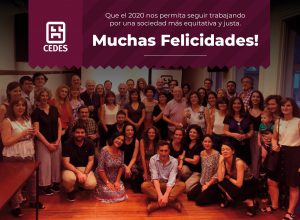 (the Centre for the Study of State and Society, a think tank) to support their ongoing projects in the health and public policy spheres. I am really looking forward to this opportunity as I have been working on health policy research at McMaster for some time now, and this will be a fantastic opportunity to learn about a health system operating with distinct challenges, political forces, and areas of strength. It will also be a test of my Spanish, having to apply it in a new domain with a new vocabulary.
(the Centre for the Study of State and Society, a think tank) to support their ongoing projects in the health and public policy spheres. I am really looking forward to this opportunity as I have been working on health policy research at McMaster for some time now, and this will be a fantastic opportunity to learn about a health system operating with distinct challenges, political forces, and areas of strength. It will also be a test of my Spanish, having to apply it in a new domain with a new vocabulary.
Following the work term, I will spend one semester at a university here in Argentina. My applications are now submitted, so here’s hoping for good news from the universities I applied to! In March I will take up studies, giving me a bit more than three months to get my Spanish in shape to keep up. This reality is at once frightening and exciting!
Reflections so far and advice for future fellows
- Aim for effort, not perfection: If I only spoke when I knew how to express myself with perfect grammar and vocabulary, I would speak very little! But trying my best (knowing I will make a ton of mistakes) has worked out quite well. Moreover, it shows that I am making an effort and most people I have come across seem to appreciate that.
- Ask questions and for help: I have been really surprised (in the best possible way) by how willing to help so many people in Canada and here in Argentina have been. I was very fortunate to have found my job in Buenos Aires because I mentioned my plans for the fellowship to a professor at McMaster who was eager to put me in touch with their colleagues. Furthermore, for so many logistical and planning questions that have arisen (like where to live in Buenos Aires and how best to go hiking in the mountains) my new friends here, and even some complete strangers, have proven to be incredible resources. In short: asking, sharing, and listening can lead to all kinds of unforeseeable adventures and opportunities (especially when it’s in your new language (see point 1))!
- Embrace the frustration but keep moving: As August 2019 rolled around and my departure date became ever more imminent, I was surprisingly calm. I think I was being willfully ignorant of the fact that spending a year away from everything I know and living in a new language would actually be quite difficult. Be that as it may, my (over)confidence was quickly put in check within my first few days here. Struggling to order a meal, suffering food poisoning from said meal, and living within a society with unfamiliar norms quickly had me feeling disoriented. Furthermore, even as my Spanish improved and I got a hang of the basics well enough to navigate feeding myself, there was a looming sense of detachment from my comfort zone. I realized that this was, at least in part, because expressing myself—my personality, my weirdness, and what I stand for—would require significant linguistic capacity. Even though I still don’t feel as though I can connect with others at such a profound level, I am trying to celebrate the small wins and to harness the frustration productively to motivate myself to improve my Spanish.
All in all, it has been quite a start to my McCall MacBain International Fellowship year! I am looking forward to what the next nine months have in store for me and the rest of the fellows across the world.
Hasta leugo,
Kartik
Home is a place that does not exist
29 November 2019 | By Faris Mecklai (Level III, McCall MacBain International Fellow, studying in Uruguay)
“Part of the confusion, once the desire to go back got off the chart, arose from the suspicion that this was simply, at least in part, the first shock of maturity: a realization that home, where you grew up and belonged — belonged with and without your own volition—no longer exists. The desire to return to it, the moment you know it no longer exists.” —S. Merwin
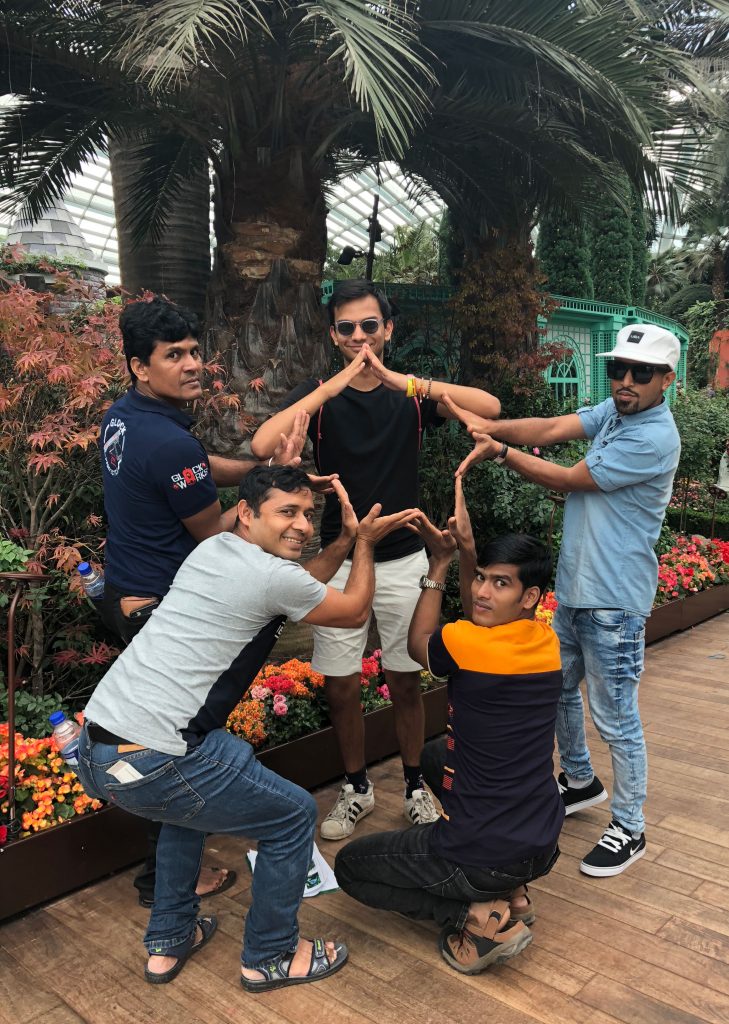 For me, home has always meant to change. I remember my very first days at McMaster when we had a meeting with Dr. Warner and his question to the incoming Artsci class was “Where is home?” Being one of the first people to have to answer, I simply said: “I was born in the GTA but moved to Vancouver a few years ago.” As more and more people answered, providing much more philosophical and Artsciesque answers, I began to ponder what home truly was for me because I genuinely did not know. If home, to Merwin, is where one belongs with or without volition, then perhaps, anywhere can become home. Perhaps we, as humans, are able to make ourselves belong anywhere. There will always be friends to make, lessons to learn, and a bed to rest our weary bones and mind no matter where we go, but I have learned that this is conditional on two things: if we will it to be so, but furthermore, if the place we are in, in turn, allows us to do so. For that, Canada, Singapore, and Uruguay have all felt like home at some point in my life because they allowed me to call them home, and because I put in the effort to do so. All are extremely difficult to leave because I am leaving a place where I feel like I did belong. For that, I have come to embrace the ambiguity that is my future, an important skill for any Artsci, and know that no matter where I go, or what I do, I will be at home, and if I’m not… then I’ll make it so.
For me, home has always meant to change. I remember my very first days at McMaster when we had a meeting with Dr. Warner and his question to the incoming Artsci class was “Where is home?” Being one of the first people to have to answer, I simply said: “I was born in the GTA but moved to Vancouver a few years ago.” As more and more people answered, providing much more philosophical and Artsciesque answers, I began to ponder what home truly was for me because I genuinely did not know. If home, to Merwin, is where one belongs with or without volition, then perhaps, anywhere can become home. Perhaps we, as humans, are able to make ourselves belong anywhere. There will always be friends to make, lessons to learn, and a bed to rest our weary bones and mind no matter where we go, but I have learned that this is conditional on two things: if we will it to be so, but furthermore, if the place we are in, in turn, allows us to do so. For that, Canada, Singapore, and Uruguay have all felt like home at some point in my life because they allowed me to call them home, and because I put in the effort to do so. All are extremely difficult to leave because I am leaving a place where I feel like I did belong. For that, I have come to embrace the ambiguity that is my future, an important skill for any Artsci, and know that no matter where I go, or what I do, I will be at home, and if I’m not… then I’ll make it so.
A place doesn’t become a home immediately. In fact, I found a sense of belonging faster in Singapore than Montevideo even though the values of Uruguay coincide much more with my own personal ones than those of Singaporean society. This summer, I worked as a casework and legal intern with the Humanitarian Organization for Migration Economics helping migrant workers win salary, abuse, and exploitation claims and cases against their employers. The bulk of my day-to-day activities involved dealing with the bureaucracy of the Ministry of Manpower (It is actually called that! I felt like I was in 1984) or the courts. In the most efficient country in the world, bureaucracy is used as a weapon in these institutions to deter migrant workers from pursuing claims against their employers. I worked at the non-domestic helpdesk which means that my clients were those who work outside of a household; typically, men from Bangladesh, China, or India who work in construction. On the other hand, the domestic helpdesk mainly helped women from Indonesia and the Philippines who work inside a household, and whose main challenges involve sexual abuse and coercion, unlawful house arrest, and salary withholdment. Classified as modern-day slaves, these workers are treated as sub-humans in Singapore without sufficient pay, shelter, or rights. Nonetheless, migrant workers still flock to Singapore for the chance to earn money to send back as remittances to their families back home. Over one-sixth of people currently on the island are migrant workers, but I highly doubt any would call it home, as much as they would like to. Singapore prides itself on its exclusivity. As a holder of a Canadian passport, I immediately had more rights than any migrant worker and as such had the ability to make Singapore my home. In other words, Kant would be very sad. It was heartbreaking to work in a society that accepted me but not the people I was there to serve.
Singapore’s urban planning division is more perfectionist than any Artsci: every blade of grass is the perfect length, every tree is evenly spaced from the next, every train and bus is always on time. It seems like there is nothing wrong with the place, and that was the most unnerving part of it all. So in terms of human rights, when the government is faced with tens of thousands of migrant workers’ claims, rather than addressing them properly, they are hidden and buried for the sake of efficiency, capital, and perfection. My job not only helped migrant workers with their claims, but in doing so, also exposed wrongs that the government tried to hide and deny. As such, by actively working against their very foundation — the hundreds of thousands of workers who build the skyscrapers, transit systems, and parks that Singaporeans take advantage of every day — the Singaporean government has created an unharmonious society.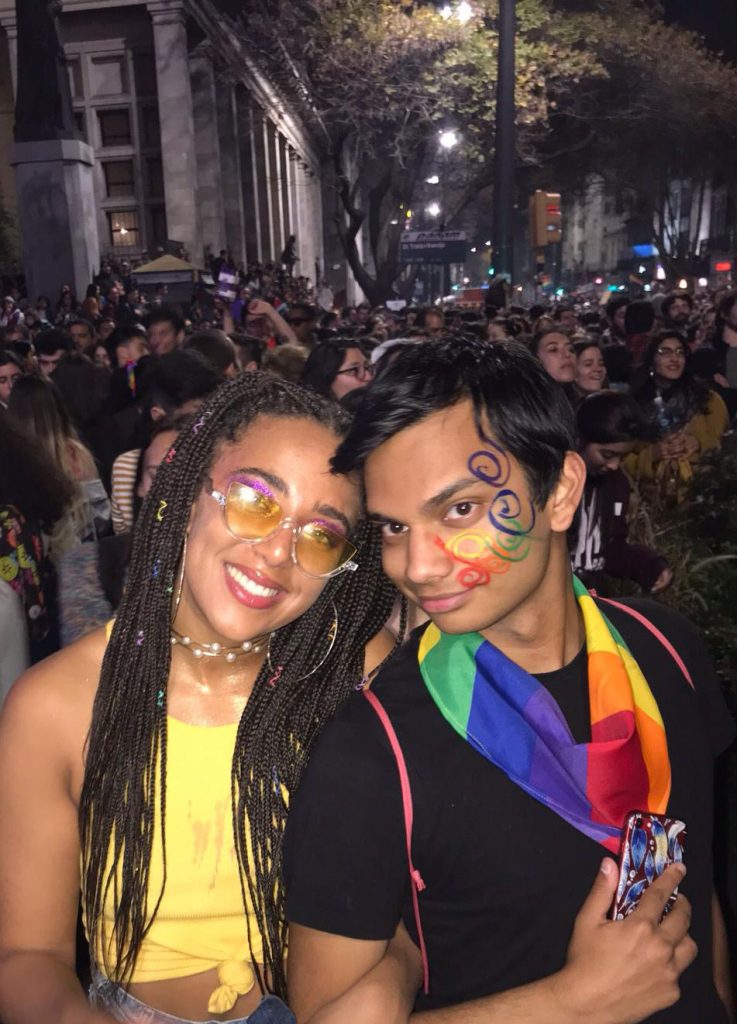
Another issue is with LGBTQ+ rights. Singapore’s pride parade, called PinkDot, is a fenced-off gathering in a park downtown that may only be attended by Singaporean citizens and permanent residents. Furthermore, foreign firms are not even allowed to fund the event. As such, I was only allowed to walk around the outskirts with all the other non-Singaporean supporters. Pride and LGBTQ+ rights are not recognized in Singapore. On the other hand, just last month, I attended Montevideo pride, Marcha por la Diversidad. The entire city packed the main boulevard, the streetlights had colored light bulbs, and the Canadian embassy, in the city’s main plaza, had a giant pride flag flying alongside our own. It was the most colourful night I’d ever experienced. This is a place that wants everyone and anyone to call it home.
With the economic, political, and social crises happening in many other Latin American nations, Uruguay has become a safe haven of stability for many people. Hospitality has long been adopted into the culture and it shines through the smiles of the people, their never-ending attempts to feed the skinny Canadian, and the number of cultural celebrations happening every weekend. Uruguay’s own “Country Brand” states that Uruguay is “a country that in a human scale of integration and freedom has built a culture of respect and tolerance with a great sense of equality injustice. It takes care of its people, providing as much as possible for their development. Uruguay is an open and accessible country based on respect and cooperation that tends to balance dedication and hard work with leisure and is underpinned by two core attributes: a particular and unique spirit and harmony in its broadest and deepest sense.”
Despite not having the preciseness, population, punctuality, or even the industrious work-ethic of Singapore (everyone here siestas every single afternoon), Uruguay has prided itself on its ability to respect and welcome all. The people have a sense of harmony and balance between themselves that was lacking in Singapore in spite of its cultural diversity. My life these past few months truly has been a tale of two cities. Singapore is chaotic yet ordered, linear, and the people have the highest spice tolerance of anywhere I’ve ever been. In Montevideo, the mood is always relaxed, laissez-faire, and someone was once disgusted when I put hot sauce on my burger. Moving from a place which literally has the ability to dictate the race of your neighbour to a city where the banks are only open from 1-5 pm was utterly shocking. Uruguay and Singapore have social and cultural values on opposite extremities of the spectrum while Canada exists somewhere in the middle.
Changing a place to a home is a privilege and a choice, not a right. As young Canadians, we are fortunate to be able to visit most of the world without restriction and, if we are up to it, find some sense of belonging. If Dr. Warner asked me again “Where is home?”, my answer would be wherever I make it so that allows me. My home is dynamic, unconfined, and based on myself and my values rather than an actual physical space. Whether in a hyper-optimized, meticulously planned, megacity, or a carefree and gentle nation, we have to be willing to be courageous enough to leave everything we’ve ever known behind and set up social systems, make friends, learn languages, and put our “Canadianness” in the backseat in order to embrace a new culture and society. I was allowed and encouraged to do these things in Singapore and Uruguay and have absolutely no idea where the next place to become a home will be… but that’s the way I like it.
